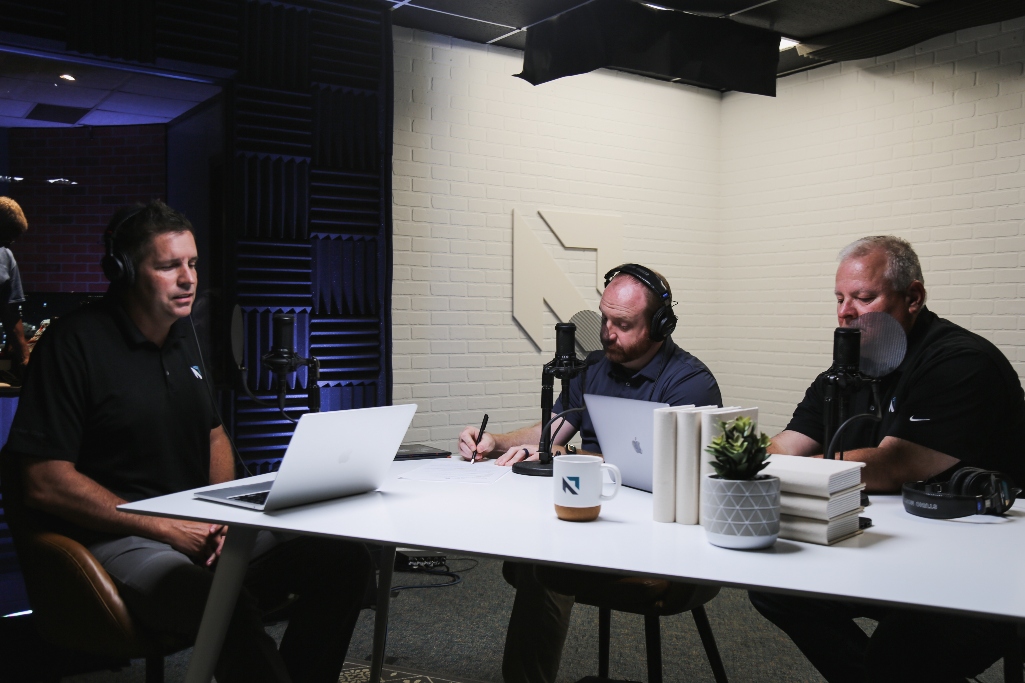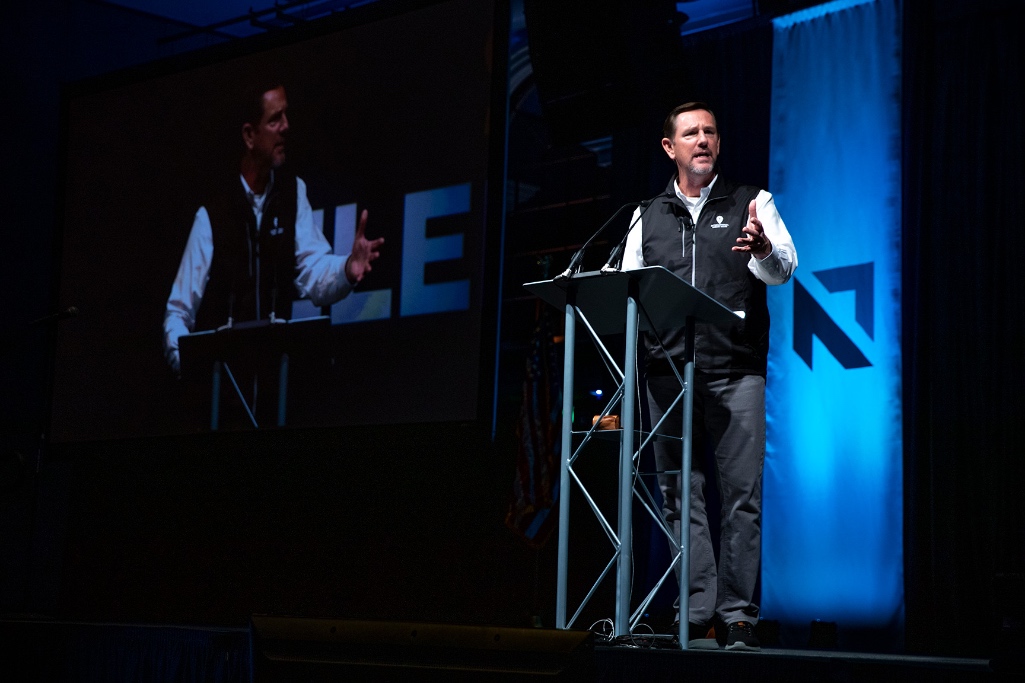
Terry Long, Keelan Cook and Sandy Marks recorded a recent episode of the N.C. Baptist podcast on issues related to pastoral health.
The social and political unrest of recent years has taken a toll on just about everyone, but pastors have been impacted particularly hard. Several surveys and indicators have demonstrated an alarming decline in the overall health and well-being of pastors, with many on the brink of burnout and some leaving the ministry altogether.
Three statewide ministry leaders recently recorded an episode of the N.C. Baptist podcast related to pastoral health. They were: Terry Long, church health and revitalization strategist with the Baptist State Convention of North Carolina; Sandy Marks, pastoral ministry strategist with the Baptist State Convention of North Carolina; and Keelan Cook, director of the Center for Great Commission Studies at Southeastern Baptist Theological Seminary.
Following is an abbreviated transcript of their wide-ranging conversation, which has been edited for length and clarity. To listen to the complete podcast interview, visit ncbaptist.org/podcast.
Terry Long: What are some trends that you are seeing in the landscape right now with pastoral health?
Keelan Cook: One big trend is the fact that we’re now ministering in an environment where churches overall are in decline. Outside the church, another trend that we’re seeing is reputational decline (of churches and pastors). And then on top of that, pastors are in a situation today where it’s getting harder and harder just to meet their own basic physical needs. There was a report recently by Lifeway Research talking about the stagnation of pastoral wages. And so it really seems that inside the church, outside the church and inside the home, pastors have got a lot of trends that are really pushing against their well-being.
Sandy Marks: A big thing is just struggling with identity. Pastoring has always been hard. It’s always been a difficult task, but coupled with that, there’s always been a sense of joy and excitement to serve the Lord (and) to serve His church. But you add all of that additional emotional baggage and weight, it’s hard not internalize that and be discouraged.
KC: I’ll have pastors confide in me a level of hopelessness. The normal burdens that a pastor felt for shepherding the flock are now accompanied by these additional stressors, which starts to turn into conversations about burnout.
TL: What are you doing to prepare pastors in ministry and those going into ministry related to burnout?
KC: One of those things is having more frank and open conversations about spiritual health, spiritual formation and emotional health. We’re also talking about the realities of pastoral ministry in the 21st century. The majority of churches right now are in some form of decline. So for the majority, pastoral ministry is revitalization, which means they will be moving into a situation where renewal is going to be necessary. Pastoral ministry right now likely means that you’re now a church revitalizer whether you know it or not.
SM: Yeah, absolutely. A big part is understanding that. And if pastors are not caring for themselves spiritually, then the church that needs revitalization is going to take its toll on a pastor.
TL: Talk to us for a second about that.
SM: I was asked the other day, “What’s the most important attribute in a pastor other than the calling of God?” I think it’s just self-awareness. Being aware of where we are, spiritually, physically and emotionally. We have to help our congregations process through all of those areas. So, if we’re not at a point where we can be honest about where we are and strive to make adjustments moving forward, then we’re just going to be eaten alive.
TL: Give me one thing a pastor can do right now to help their emotional state or spiritual state.
SM: Set boundaries. When I think about pastoral wellness, I think about pastoral rhythms. Understand what we can do, and what we can’t do. Pacing ourselves, understanding and setting boundaries, and making self-care a priority are big things.
KC: Don’t pastor alone. We’ve got to be able to have other people that have eyeballs on our life. That may be other people in your congregation, it may be other leaders if you have a plurality of elders or other pastoral staff. It may be leaning into the relationships that you have at the state convention, in your local association or with other pastors in your area. You’ve got to be in a situation where you can have open fellowship, honesty and accountability.
SM: I love what Paul David Tripp says in his book, “Dangerous Calling.” As pastors, we often find ourselves in the body, but not getting the benefits of the body. One of the benefits of the body is accountability. We need that community as pastors.
TL: What is one thing that undergirds all of this?
KC: One word. Prayer. There’s something to the way the Scriptures talk about prayer. The kind of abiding that we see in the Book of John comes from a rich and fruitful prayer life.
SM: As we nurture our relationship with Christ, it enables us to maintain proper relationships with our congregation. I’ve noticed when me and God are struggling, me and other folks struggle, as well. But when me and God are in tune and I’m developing and nurturing that relationship, then I get along with folks a whole lot better, you know?
TL: When a pastor is in prayer and understands that the risen Jesus Christ is fighting for him, what does that do for a pastor and his confidence to lead through tough times?
SM: It gives him confidence, but it also gives him patience. Leadership is a journey, and leadership is a process. It’s a process that involves understanding that God is going to build His church. It’s His church, and it’s His time.
TL: What’s one practical thing from each of you that a church could do to help their pastor’s health?
SM: There’s nothing that encourages a pastor more than caring for his family. You can certainly do that by doing as much as you can to compensate him well, but also just loving on his family and encouraging them. Take initiative and be an advocate for him. Simply ask, “Pastor, how are you and your family doing?”
KC: I’m going to say a sabbatical. That’s a touchy topic in some churches. And a lot of churches don’t think they have the resources or the ability to do something like that. It could be as simple as letting it be OK if he’s not there for a few weeks where you still pay his salary, find some pulpit supply, and let him have some time dedicated for himself, his family, and for rest and renewal.
TL: Great conversation. Let’s take it to the personal level. What’s one personal encouragement to pastors from each of you?
KC: Recall where your true identity lies. Your identity is found in Christ. It’s not found in your position, it’s not found in your platform, it’s not found in any of those things. And so when those things feel like they’re faltering, your identity is safe because it’s located in Christ, and He doesn’t falter.
SM: I remember one of the most pivotal times for me at a point of real discouragement was just taking a day. Go somewhere where you can just be alone with God and have some personal worship. It’s amazing what a day of clarity with the Lord can bring to you. Take a day to be alone with the Lord and allow Him to speak to you.
(EDITOR’S NOTE – This article originally appeared in the October 2023 edition of the Biblical Recorder magazine. To listen to the full conversation this article is based upon, visit ncbaptist.org/podcast.)


